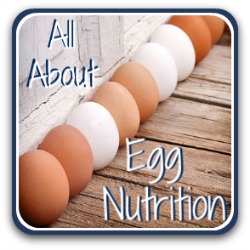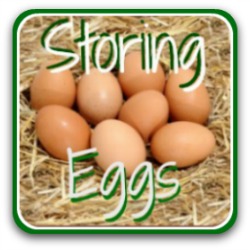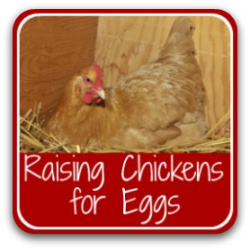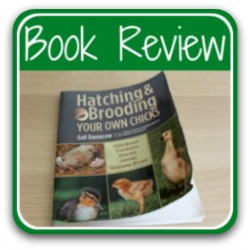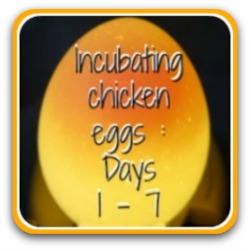- Home
- Egg recipes
- Freezing
Freezing chicken eggs: a solution to that summer glut.
You know how it is: plenty of eggs in the summer and a real slow-down in winter.
Do you give away a lot of your flock's produce during the summer months, to the point when neighbours start saying: "please – no more eggs!"?.
They're not ungrateful, there are just soooooo many!
If that sounds familiar, here's a possible solution for you...
Try freezing your chickens' eggs!
It may sound strange, but frozen eggs can be kept for up to one year in your freezer, then defrosted and used in just about any recipe you can think of.
There's only one caveat to this: don't use defrosted egg raw. Make sure the recipe you use frozen eggs for cooks them well.
If that sounds like a great idea to you – let's do it!
There are three ways of freezing eggs: whole, just the white and just the yolk.
Let's deal with freezing the whole egg first.

This is a long, detailed page.
Use these links if you want to skip to a particular section, or continue to scroll down for the whole article.

The process of freezing whole chicken eggs for cooking.
Freezing whole eggs isn't difficult. You can use an ordinary freezer container and add as many eggs as you like in one solid block.
That's not very convenient when it comes to using the eggs for cooking, though. How to know the number of eggs in the block, or even part of the block?
A more convenient way is to store them as individual eggs. That way, when you come to defrost them you know exactly how much frozen solution equals one egg.
Here's how.
 One of my eggs = 8 cubes
One of my eggs = 8 cubesDon't use an electric whisk or even a hand beater for this.
- Start with just one egg. Break it into a cup and, with a fork, very gently beat the white and yolk together until they're combined.
If you beat it any harder you'll add too much air, which will make it rubbery when you defrost and use it later.
- Now pour into an ice cube tray. Be careful of the white – the chalazae (the stringy bit) tends to move quickly and can overflow.
- Make a note of how many cubes equals one chicken egg. Once you've done that, combine as many whole eggs as you want, fill up the ice cube tray and freeze.
- When frozen, empty the cubes into a freezer bag and label, making clear how many cubes equal one egg. In my case, one whole egg fills eight ice cube blocks. Put back into the freezer and you're done!
- Note: If you're freezing a lot of eggs, ice cube trays can be fiddly. Try using a muffin tin instead. Silicone containers work particularly well. See here for more information.
Lots of lovely chicken eggs to use during those less productive winter months!

Freezing just the egg whites.
If you regularly use whites alone, you can freeze them separately to the yolk.
- Separate the white of one chicken egg from the yolk. Don't beat it, even gently. Just pour into the ice cube tray. Measure how many blocks one egg takes, then add as many whites as you want to freeze.
- There's no need to add anything else. Just put them into the freezer. As before, when frozen put into a freezer bag and label.
Like whole eggs, whites will last for up to one year in your freezer. They can be used as normal in any recipe.
Freezing egg whites has been found to improve their ability to foam when defrosted, so they're particularly good for creating light sponges and meringues, for example.(1)

Freezing just the egg yolks.
It's possible to freeze the yolk of a chicken egg separately too, but it requires a little more attention.
If frozen by themselves, yolks tend to go thick and lumpy when defrosted. In that state they won't be any use for recipes.
If you'll be using the yolks for savoury dishes when defrosted, stir in one quarter teaspoon of salt per six yolks (not per yolk!) before freezing.
If you're more likely to use them for sweet things, add 2¼ teaspoons of sugar per yolk.(2)
Then just add to your freezer tray as before.

Note: the defrosted eggs can make dishes taste slightly salty or sweet when used in recipes as a result of using these additives. Cut down the amounts used in recipes accordingly.

Freezing cooked eggs: does it work?
It's possible to freeze cooked eggs, but not recommended in terms of taste and texture.
The consistency of cooked eggs changes when they're frozen, so whether you try to freeze scrambled, hard boiled, fried or poached, they tend to go hard and very rubbery when defrosted.
Much better to freeze them raw.

How about freezing eggs in the shell?
This is not only not recommended, it can be dangerous to health.
Freezing liquids makes them expand. If you try to freeze chicken eggs in their shell, the shell will crack. The egg is then susceptible to bacterial infection.(3)
So remove them from the shell before freezing.

Freezing cooked egg recipes.
Cooked egg dishes like casseroles and quiches can be frozen, but should be used within two or three months.
It's critical to cool cooked dishes quickly and freeze immediately they're cold, so that bacteria don't have a chance to multiply.(4)
Cutting egg dishes like quiches into individual slices can help both cool and freeze them more quickly than leaving it whole.
 Freezing egg dishes as individual slices can help speed up the process.
Freezing egg dishes as individual slices can help speed up the process.
Thawing and using frozen chicken eggs.
- Frozen eggs should be kept for no longer than one year in a freezer, and should not be re-frozen once defrosted.(5)
- Whether you've frozen them whole or separated, defrost in a refrigerator overnight and use within one day of defrosting.
- If you've frozen the whites alone, they should be left to stand at room temperature for about 30 minutes if you're planning to use them beaten. They're perfect in meringues.
- Do not try to defrost in a microwave. The eggs will be inedible!
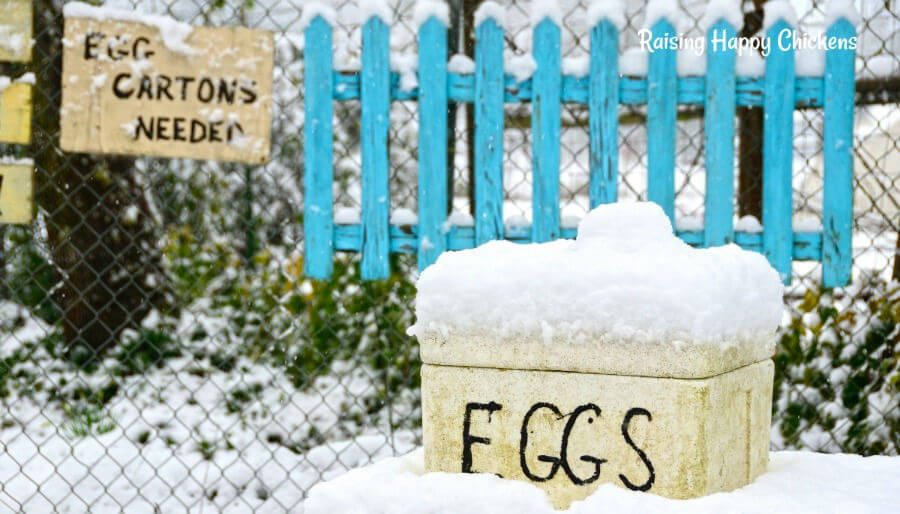 You could try standing them in the snow but it's probably easier to use the freezer!
You could try standing them in the snow but it's probably easier to use the freezer!
Are there any problems with freezing chicken eggs?
- Defrosting eggs at room temperature can be dangerous. Bacteria is inactive when frozen, but as soon as eggs start to thaw and become warm, any bacteria which existed before freezing will start to multiply. Salmonella is one potential effect.(5) Always defrost in the fridge.
- Frozen chicken eggs should be used as soon as they're defrosted, and should not be re-frozen. Again, the potential for bacteria is the issue here.

The best egg freezing containers.
Links in this section are "affiliate links", which means that if you click and buy something, I earn a small commission at no extra cost to you.
The best containers to use when freezing eggs are silicone. They are far easier to pop out than using metal or plastic trays, which generally need to be run under warm water to free the contents.
Using warm water can partially defrost the eggs, which introduces the potential for bacteria to form.
Something like this tray is excellent as it has a lid, which prevents spillage when the eggs are still liquid.

It's also great for storage, so if you want to keep your frozen eggs (or ice cubes!) in the container rather than bagging them, you can stack it in the freezer sideways. It takes up less room than a bag.
Alternatively, if you're freezing a large number of eggs, a silicone muffin tray may be a better option – less fiddly than ice cube blocks.
Whichever you use, make sure to label the freezer bags so that you're sure how many blocks equals one egg.

Storing eggs on your kitchen surface? You need an egg skelter!
The Egg Skelter is one of my favourite pieces of kitchen equipment. I've had mine now for several years, and it still looks as good as it did the day I bought it.
I've also bought these for various friends and relatives over the years, and everyone has loved them.
They make a really useful and very unusual Christmas or birthday gift!
To see my review and find out where to buy them, click here or on the pic.

More information about chicken eggs and nutrition.

Sources.
A lot of "facts" you'll find on the internet are often people's individual views, based on inaccurate information repeated from poor quality sources.
The information I provide in this article and others is based not just on my own experience, but on evidenced facts from scientific, peer-reviewed research and books from highly respected and experienced poultry keepers such as Gail Damerow.
Some of the trusted sources I have used in this article are these.
1. Duan, X., et al: Effect of a multiple freeze-thaw process on structural and foaming properties of individual egg white proteins. Pub. Journal of Food Chemistry, 2017.
2. Primacella, M., et al: Effect of food additives on egg yolk gelation induced by freezing. Pub. Journal of Food Chemistry, 2018.
3. Liu, Y. C., et al: Determination of the quality of stripe-marked and cracked eggs during storage. Pub. National Centre for Biotechnology Information, 2017.
4. U.S. Department of Agriculture: Egg Products and Food Safety. Pub. USDA, Food Safety and Inspection Service, 2015.
5. U.S. Department of Agriculture: The Big Thaw – Safe Defrosting Methods. Pub. USDA, Food Safety and Inspection Service, 2013.
- Home
- Egg recipes
- Freezing



